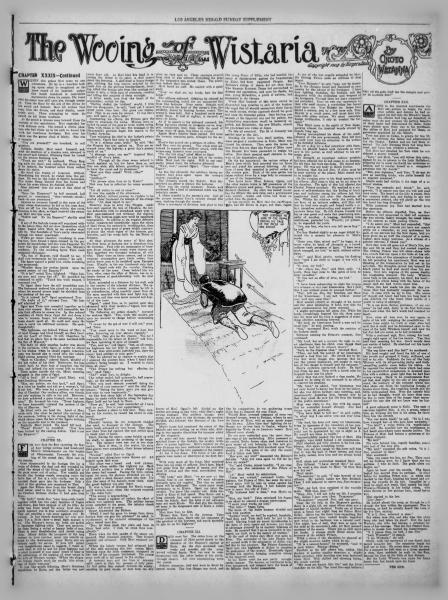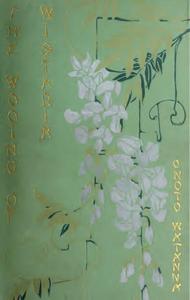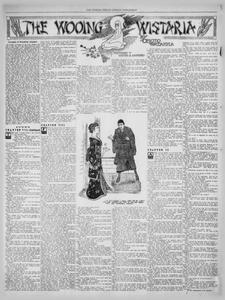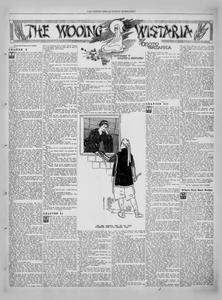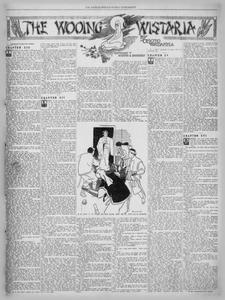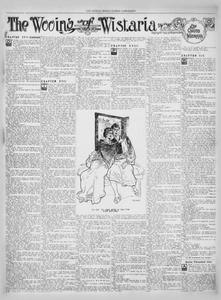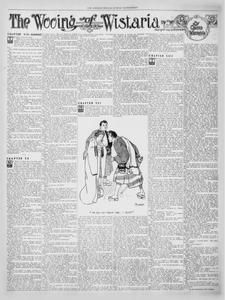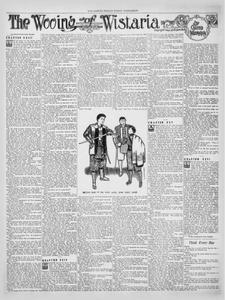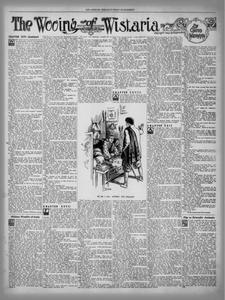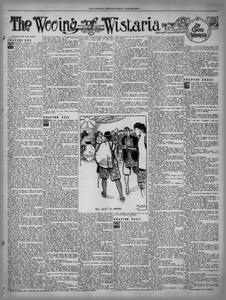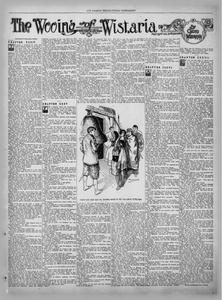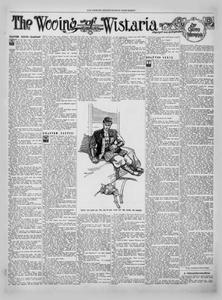Chapter XXXIX—Continued
Within the palace Mori came to consciousness. He lay in a chamber looking upon what he recognized as the inner court of the Imperial palace. One hand wandered in convulsive movements down his person. He found that his armor was still upon him, though loosened. Upon the floor by the side of the divan lay his sword and helmet. Mori fell rather than rose, from the divan, and stood dizzily, uncertainly erect. Then attempting to raise his sword, he fell from weakness.
At the sound a woman came forward from the recesses of the apartment. Mori regarded her with delirious eyes. She seemed a white phantom who had risen up in his path to taunt him with her wondrous loveliness. But over her there was the gauzy cloud of falsity. She was a vampire.
“You are yourself?” she breathed, in soft question.
Sullenly, dizzily, Mori raised himself, and, with the emotion of a drunken man, stooped to his sword and helmet. Obtaining them he turned on the woman burning eyes.
“Touch me not,” he muttered. Then flinging aside the door, and seeking the stairway as if by instinct, he tumbled rather than walked down the stairs.
He heard the tramp of horsemen without. Brandishing his sword, he rushed into the gardens. He was in the midst of Oguri’s horsemen. The leader flung himself from his horse and threw his arms about his disabled chief.
Mori tottered into the arms of the chief of his staff.
“Seize the Emperor!” he half moaned, half gasped, in command; “then—retreat—south—back—to our provinces.”
Anxious to retrieve himself in the eyes of the army whose destruction he laid at his own door, Toro set off for the building within the court, shouting to his men, as Oguri received the swooning Mori into his arms.
“Follow me! To the Emperor!” shrilly cried Toro.
If any of the bakufu troops still remained within the palace they did not show themselves while Oguri, busied with Mori, let his cavalry stand idly by. The footfalls of Toro’s party resounded through the inner quadrangle.
Within an inner chamber, crouching in seeming fear, Toro found a figure dressed in the garments his knowledge told him were Imperial. He knew that the central palace was the Mikado’s residence. To the crouching figure Toro made respectful obeisance.
“Oh, Son of Heaven, yield thyself to me. I shall care reverently for thy person,” he said.
The figure raised a pallid face, while trembling lips murmured:
“Wouldst thou lay profane hands upon the sacred person of thy Emperor?”
“It is he!” cried Toro, delighted. “Seize him, my men, and carry him off.” He modified his command to add: “Touch him with respect, I command you.”
To Oguri they bore the still trembling man. The lieutenant ordered him placed in a norimon, where his sacred person might be shielded from the scrutiny of his men.
“Is it indeed he?” Oguri questioned Toro.
“No doubt of it,” returned Toro. “He himself admitted it.”
Oguri and Toro now consulted together as to their next course. Mori was still insensible, despite their efforts to arouse him. In the reduced condition of their force, Oguri did not deem it wise to remain longer, lest returning bakufu hosts should spoil all. He could not spare the men to carry an additional norimon. He spoke thoughtfully:
“His highness, our beloved Prince of Mori, is of royal lineage and blood himself, as thou knowest, my Lord of Catzu. It will, therefore, be best that ye place him in the same norimon with the Son of Heaven.”
The body of their senseless leader was placed in the norimon, while Oguri, in order to attend to his wishes when he should regain consciousness, was forced also to crowd into the vehicle. Eight strong samurai lifted the carriage.
“Back to Choshui,” ordered Oguri, mindful of the last order of his chief. Moreover, the long march back to their base of supplies was the best, and indeed the only course left to them.
Three miles outside the city, Mori, moaning, struggled in the arms of Oguri.
“All is lost! All is lost!” cried Mori, with heart-breaking bitterness.
“Nay, my prince, my dear lord,” said Oguri, in a voice as tender and soft as a woman’s, “all is not lost. We were but a portion of our one clan of Choshui. Our southern allies, our friends, are only waiting to rally to thy aid. Moreover, we have achieved a great triumph over our enemies.” He lowered his voice. “Your highness, we have honorably captured the person of the Son of Heaven. See!”
He lifted with one hand the head of Mori, while with the other he parted the curtains of the norimon, letting in the strong light of day, which shone upon the face of the figure reclining on the opposite seat in the norimon.
Painfully Mori looked. His head fell back.
“Fools! Fools!” he mumbled. “You have been tricked by the cunning Aidzu. That is not the Emperor.”
Chapter XL
For two days the fleet carrying the flags of four foreign nations had bombarded Mori’s intrenchments on the heights of Shimonoseki. Towards the evening of the second day, Mori cast up the results.
Guns dismounted by the foreign fire lay in heaps of debris, the dead and the wounded impeded the steps of the living, and fully half of the guns were out of action. Yet steadily and fiercely the foreign vessels, sweeping across the fort’s line of fire in a wide circle, one by one emptied their guns into the fortress. Only a third of the garrison now remained to Mori.
Again the Prince drew from his breast Jiro’s brief letter, sent to him by Oguri, in charge of the Choshui fortress, whither it had gone from Kioto.
“My lord,” wrote Jiro, “your honorable family together with the two cadet families of Nagate and Suwo, has been stripped of all its titles. An order has been issued for every loyal clan to march against you in your southern stronghold. They are sending a vast army against you. Be warned. It has already departed for your province. Yet a little cheer—a small light appears to me. The shogun’s troops, my lord, are garbed in Japanese fighting attire. They are, moreover, far from being a united or happy body of men. There is sore dissatisfaction and unrest among them. Many dislike the prospect of the long journey to your province, many are secretly opposed to the chastisement, many Kioto men are entirely unfit for service. If you will permit your insignificant vassal to suggest, I would remark that it will be well for your highness now to avail yourself of your many years of labor in the perfection of the training of your troops in the arts of Western warfare. When the shogunate troops finally reach the south, take advantage of their weakness.”
It was the month following Mori’s disastrous expedition to Kioto, and the letter was now many days old. As Mori bent his head in restoring the letter to its place, a dull impact shook the fortress. A shell from a heavy foreign gun, striking the long cannon erected by the youth Jiro at the previous bombardment, bursting, rolled into the bronze tube from the carriage and swept it into a little knot of pioneers, crushing and killing the majority of them outright.
A bitter smile, torn from the heart of the commander, curled his lips.
“Having defiled the ‘civilized’ world, I little fear the shogunate,” he said; “and yet I cannot spend more time here. Our guns are dismantled. That is an omen for retreat. It was Jiro’s gun, and here is Jiro’s letter.”
Summoning his officers, the Prince gave the order to evacuate the works. Horses were attached to such of the guns as were worth saving. Then, with these in the rear, the remnant of the Shimonoseki garrison began the march to the Choshui fortress.
Upon rejoining his chief in the latter’s private apartment, Oguri had news to impart.
“It is a strange army, truly,” he said, “that the Shogun has sent against us. They are encamped near the highway, a good day’s journey north of us.”
“A strange army, you say?” inquired Mori, mindful of Jiro’s letter.
“Ay. Though all the clans were ordered to march against us, but few have done so, and they are sick, silly fellows, growling at having to leave the court and its pleasures.”
“How are they armed? With rifles?”
“Some.”
“Artillery?”
“The pieces taken from us in Kioto.”
Mori was lost in reflection for some moments. Then:
“Let all retire to rest at once.”
It was the middle of the afternoon.
Mori added, without pausing to explain to his puzzled chief lieutenant the reason of his strange order: “At dusk report to me.”
However large an army of the Shogun might have sent against the men of Choshui, the fortress defenders with its attendant army went to their unaccustomed rest without the slightest fear. The fortress might now well be considered impregnable. In addition to its regular defensive works, constructed immediately upon the return of Mori from his melancholy wedding-day, there were now a deep moat of great width constructed about the whole region of the fortress, gun-factories, and the works built by the Prince of Satsuma.
All that afternoon the army of Mori slept. The first hour of darkness saw a departure from the fortress. First rode six companies of horse-men, from whose body scouts were thrown out. Next marched two thousand infantry, all with rifles. They wore no heavy armor, and as their company commanders gave their orders, their tactics were seen to be modeled upon European forms. Finally, in the rear lumbered sixty field-pieces. Oguri rode with the cavalry, directing the route of the army. Close behind him was Toro, who, since the affair of Kioto, was on intimate terms of good-fellowship with the chief lieutenant.
Mori, attended at a distance by his staff, rode in the centre of the infantry division. The entire direction of the current routine he left to his subordinates, riding moodily apart from all. The men marched with firm and light step. On their own soil they were more assured and hopeful of the issue.
“Oguri,” asked Toro, as in perfect quiet they advanced with their cavalry—“Oguri, how may I atone for Kioto?”
“By following my orders closely,” answered the serious Oguri. “You, with the cavalry, are upon no account to charge before cannonading begins.”
“I swear by the god of war I will not,” promised Toro.
“You must move to the west at least four miles, throwing out your scouts regularly.”
“I will. Only give me the chance. Was not I responsible for the failure at Kioto?” said Toro, his face quivering in spite of himself.
“Yes, and no,” said Oguri; “but, at all events, his highness has not held it against you. He told me that after-events justified you, since the enemy had artillery at your gate.”
“But he allowed me no chance to explain that I ordered the pioneers back when I heard their artillery being brought up. I wanted to check them at once.”
“The Prince has nothing but affection for you,” said Oguri.
“Ah!” cried Toro, in delight.
The other smiled, half paternally, half reprovingly, at the enthusiasm of youth.
“But you must restrain yourself during the first half of your maneuver,” said the chief lieutenant; “during the latter part you may give free rein to your impetuosity.”
As the first sharp light of the September day began to make visible objects along the highway, Oguri held out his hand to Toro.
“Now go,” he said, “and remember all I have said to you. Now is your opportunity.”
Toro dashed a sleeve to his face. Then, turning to his cavalry, he raised his sword in command.
“Forward!”
Sharply turning, the six companies wheeled due east, to disappear in the distance. The main body advanced for two hours. Then Oguri saw that Toro had reached the spot settled upon in their plan of battle.
Mori, leaving the centre, came briskly up with his staff, to assume the ordering of the formation. The infantry were set out in two close ranks. Back of them, in the centre, the sixty field-pieces were assembled, their horses tethered close by.
“Scouts!” called Mori to Oguri.
Scouts and skrimishers were thrown ou. All rested upon their arms.
The place was a broad and level plateau, through whose middle the highway ran. Back of Mori’s artillery rose a steady height which the army had crossed. Facing the force, resting upon its arms, the plateau stretched out for a mile until a sharp descent came into view. Up this the army of the bakufu must climb, since the great highway was also there.
It was a time of idleness for Mori’s troops, until towards noon, when the outposts reported to the main body:
“The enemy is approaching.”
Mori issued a number of orders, the effect of which was instantly seen. The artillery horses were attached to the guns, the infantry closed ranks. All stood at arms.
Oguri approached the Prince.
“Shall I send the guns to sweep them down before they can gain the plateau?” he asked, in excitement, as the natural advantages of the place seized upon him.
“No; let them reach the plain and form in their best order. I wish to crush them completely.”
Even when the first ranks of the enemy appeared, Mori remained inactive. They formed quickly and advanced. Still Mori remained impassive.
When the bakufu troops had advanced half of the mile separating the two armies, Mori, turning upon the little eminence, whispered in the ear of his youngest lieutenant. The young man rode off at full speed to the artillery.
A moment more and the lines of infantry split apart to allow the passage of forty guns. At full gallop they rushed towards the enemy, sending up great clouds of dust from the dry plain as they sped on. Their carriages swayed from side to side without disturbing the pose of the impassive men seated there. The postilions lashed their horses.
Mori faced his staff. He smiled with a quiet sile.
“Now we shall see, my lords, how the line holds.”
The officers addressed, thinking he referred to the cannonading, looked for an unexpected fire from the batteries. None came. Straight and true towards the heart of the enemy’s lines, the artillery, drawn by foaming horses, rushed. The enemy’s lines held. But a hundred yards separated them. It held at eighty; it wavered; at sixty—it broke.
As if in answer to his unheard command, his flying batteries whirled in irregular curves, stopped, unlimbered, fired, then with the speed of wings were off again, this time in retreat.
Again Mori’s infantry lines parted. Out went the twenty remaining guns, straight for the enemy.
Mori’s lips poured out a stream of orders. His staff flew over the ground. The whole army advanced to support the artillery attack, while the boomerang batteries were recovered.
“To the left wing,” cried Mori to Oguri.
Oguri placed himself to the left of the centre, while Mori took the right. Still in one compactly joined front, the infantry advanced.
“Now, now,” moaned Oguri. “Toro—where is Toro?”
As the line advanced, the artillery, having reloaded, bore down again upon the enemy’s centre, pounding it.
The infantry neared the bakufu. Mori dispatched an officer to silence the batteries.
Now was the crucial moment. Broken and scattered like a herd of untrained cattle was the bakufu’s centre.
A cheer sounded in the enemy’s rear. Just at the proper moment Toro’s cavalry charged the rear, dashing through the centre.
Now a movement of division took place in the forces of Mori. Oguri’s left divided on the centre and swung to the west, while Mori’s right swung eastward. The artillery became two corps, one for each of the divisions; the cavalry, divided, also followed the direction of the two leaders.
Mori’s forces had sundered the centre of the bakufu and were rolling up on either side, driving in two opposite directions the immense army of the shogunate.
As panic and fear spread through the poor-spirited forces of the bakufu, the cavalry withdrew to pursue fugitives. Mori’s infantry in its two divisions was now sufficient for the isolating and destroying of the two segments of the enemy.
At last it was done. The forces of the shogunate were routed or destroyed at the first battle.
With every mark of his favor, Mori received Toro into his circle of officers. Toro’s face, black and grimy from the smoke of cannon and the dust of action and the road, nevertheless was shining.
“My lords,” said Mori, “we are now at the crucial time in our career. We must advance instantly upon the capital. This time no small force will be sufficient. The entire army must accompany us to Kioto. Oguri, you take the cavalry. You know the country well. Ride forward to Kioto at full speed. Then throw out a long skirmish line and capture every fugitive from the bakufu, that the news of our advance may not reach Kioto. We shall give the depleted army of the shogunate now in Kioto a noble surprise.”
Mori drew Toro to him.
“Return thou, Toro, to the fortress. Take every available man, leave only the company of the governor of the fortress, and march speedily to join me on the highway.”
Chapter XLI
Days went by. The entire force at the command of Mori moved slowly in the direction of the Emperor’s capital of Kioto. As the days stretched into weeks and months, still the army moved without haste. Mori was now in communication with the other leaders of his party, through runners. All were concentrating upon the capital.
Echizen, moreover, had sent word to Mori by special courier. The boy Shogun was dead, and the young Prince of Mito, who had headed the army of chastisement against the Imperialists in Kioto, had been appointed Shogun. But Echizen’s tidings of death did not stop here. The Emperor Kommei Tenno had succumbed to disease and oppression, and upon his death, his son, young Mutsuhito, a youth of sixteen, had succeeded to the throne.
When Mori learned of this latter event he dispatched long epistles to each of the leaders. He urged that all should concentrate their forces in small parties, whose approach should be gradual upon the Imperial palace. Once having possession of the Imperial city and the palace, the Aidzu-Catzu supporters would be instantly expelled, and Mutsuhito, the new Mikado, should be proclaimed sole ruler of Japan.
To this all assented. The 3d of January was settled upon as the day.
Dividing his force into small parties, who were assigned a rendezvous in Kioto, Mori continued his advance. Then came the news to him from Echizen that the Prince of Mito (now the Shogun) had been persuaded to resign his office. Now there seemed small obstacle in the way of the Imperialist plan.
On the day appointed, the various relays of Mori’s force which had preceded him to Kioto met and joined his personal following. At the hour of noon they marched in perfect order to the western gate. Each of the nine gates was taken without force by a large body in command of one of the Imperialists.
Two hours later Mori, Echizen, Oguri, and the other leaders were in fell possession of the Mikado’s person and policy. The shogunate was declared abolished. An edict was issued declaring the Mikado the sole ruler, and a government was created. Aidzu and Catzu had been expelled from the palace.
It was reported to Mori that the ex-Shogun, Mito, had left Kioto in anger, and that, regrettinghis resignation, he was gathering troops about him to dispute the coup d’etat.
Wearily Mori assumed command of some two thousand troops, went to Fushimi, where he met the Prince of Mito, with an army much larger than his own. After three days’ fighting the ex-Shogun was driven back to Ozaka, whence he departed for Yedo on an American vessel. Mori followed more slowly.
He was now embarked upon the most desperate stage of his undertaking Mito possessed in his capital, Yedo, forces, ships, and resources in great excess of any belonging to the new government. Nevertheless Mori marched upon Yedo steadily. At the gates of the city the senior Lord of Catzu met Mori.
“How now, my lord?” demanded the Mikado’s defender. “Are you come again to bid me lay down my arms?”
“No,” said Catzu, almost humbly. “I am come to offer you the submission of the Prince of Mito.”
“Ah!” Mori veiled his satisfaction.
“Under my counsel,” continued Catzu, “his highness, the Prince of Mito, has seen his error. Never again will he take up arms against his sovereign lord the Mikado. I but beseech you now to spare the city of Yedo.”
“My business here is done,” was Mori’s reply.
“Stay, my lord.” Catzu entwined his fingers in an effort to conceal a strange nervousness.
“I await your words, my lord.”
“Thy wife—” began Catzu.
The brain of the leader became clouded and dark with passion.
“Another word, my lord,” he replied, haughtily, “and thou and Yedo shall both be put to the sword. Having found my armor invulnerable to the darts of your spears and arrows, you think to advantage yourself by an ancient weakness of mine. Be assured that I am as invincible in that regard, my lord, as in the matter of warfare.”
At the end of twelve days Mori was again in Kioto. The surrender of the late Shogun had not carried with it the submission of Aidzu, who had fled to his province. The Prince dispatched Oguri into the highlands of Aidzu to compete the unification of the country. Eventually Oguri fulfilled his mission, bringing complete victory to the Imperial cause.
In the Kioto court the new party wrought speedy change. The daimios, or territorial lords, were summoned, and resigned into the hands of the Mikado their feudal possessions.
At one of the last councils attended by Mori, the Shining Prince made an address of deep import.
“Your Majesty,” he said, “may not be insensible to the changes forced and hastened in your country by the advent of the foreigner. I have been fighting feudalism, the bakufu, and the shogunate with the civilization and weapons of the foreigners. Through them we have conquered and prevailed. Since we owe our supremacy to their rifle and cannon, a conviction has forced itself upon me. Your Majesty no longer lives behind a screen, seen by a few eyes only. Your Majesty is a world power, and must have relations with other nations. We must assimilate foreign civilization, if only to combat the foreigner.”
Thus Mori came to the spirit of New Japan, speaking almost the identical words uttered by Iyesada long ago.
Having accomplished his share of the establishment of the new government, Mori felt that he could now turn his attention to the welfare of his faithful followers.
He set a day for a final interview with them, when he should bestow such rewards as were now in his power, as chief adviser to this sovereign, give.
For himself, an important cabinet portfolio had been offered, but he had come to no decision. He felt that his work was done. He desired only peace. He was not ready to think further.
Realizing that the lost Jiro, if alive, must be in some portion of the palace, Mori caused him to be sought for.
On the evening prior to his final meeting with his officers, Jiro came to him as he sat alone in his chamber. The sight of the lad affected the Choshui Prince peculiarly. He realized in a moment of self-revelation that the feeling of loneliness and isolation among his officers had first manifested itself just after the departure of Jiro. While his relations with the youth had not been of an intimate nature, still Mori felt that he had ever sought and found tacitly a silent, unspoken understanding and support of his purposes from him. He felt drawn towards the boy as one great soul seeks the penetrating sympathy of another. A longing, throbbing into wistfulness, pervaded him. Wearily, yet patiently, he regarded the youth.
“Jiro, my boy, why have you left me so long?” he said.
The boy flushed slightly as an eager delight betrayed for a moment his pleasure in Mori’s words.
“Have you, then, missed me?” he began, in a warm voice, to break off abruptly as a forced coldness took possession of him. “I have been much engaged, my lord,” he said, without enthusiasm.
“Ah!” said Mori, quietly, noting his flushing face; “and I am ready to wager it was with a maiden.”
“It was, my lord.”
“Ah—thou, too, Jiro,” said Mori, sadly. “A youth, thou hast come to the gates of love, to enter paradise.”
“It was not an affair of love, my lord.”
“No?”
“I have been endeavoring to right the wrongs of a woman—a very near kinswoman. But I find that I am without power to proceed further.”
“Nay, tell me, Jiro, thy troubles, and those of thy kinswoman. I am not without power now, and may assist thee.”
Mori smiled pitifully at thought of his power and the poor satisfaction it held, now that it s great consummation had been crowned.
A slight nervousness fell upon Jiro. While his hands tremblingly fingered his obi, there came into his eyes and his voice a suggestion of something ulterior, something beyond.
“My lord, my kinswoman loved a man and he loved her,” he said, pausing.
“Sad,” murmured Mori, with the cynicism of his broken mood.
Without noticing the Prince’s comment, Jiro continued:
“My lord, has not a parent the right to exact obedience from his child, even though that obedience lead her to utmost misery?”
“Such is the Japanese idea,” returned Mori.
“Then, my lord, the parent of my kinswoman exacted a task from her. He forced her to betray her love, though she, ignorant that he was the person implicated, yet sought to warn him of the danger to himself and the unknown.”
Mori’s eyebrows contracted darkly. He half rose from his seat. Then with a forced calm he dropped back into his place.
Jiro’s face was now flushed a deep scarlet. He seemed to be using all his strength in an effort to control his emotions.
“My lord,” he added, “my kinswoman was not only forced to betray her lover by her father, but she was driven further—into marrying, and, consequently, degrading him, because only in that way could she save his life from the hands of the public executioner.”
Mori was white to the lips with his anger. But he controlled himself strongly. Jiro had claims upon his gratitude.
“You have failed to tell me,” he said, coldly, “in what way I can serve you—and your kinswoman.”
“My lord, the lover put away my kinswoman, being in ignorance of the treachery of her parent. Yet so grievously is he wounded that he could not be approached by one so slight as I. He would not listen to truth.”
Impenetrability masked the face of Mori. His thoughts were veiled behind a set countenance. Half abashed, Jiro spoke trembling words.
“Do you, my lord, speak to this lover—tell him that it was the fault of their fathers, and that his lady, indeed, loves him and has always loved him.”
Still silent and motionless remained Mori.
Jiro faltered. “I have served thee,” he said, as he went a step closer to Mori; “do thou this now for me.”
Mori spoke.
“To-morrow,” he said, “I take farewell of my officers. My worldly tasks are then finished. Then I will endeavor to serve you, Jiro—to-morrow.”
“But, my lord, thou speakest of thy worldly tasks. Wilt thou, then--?”
“Nay, Jiro, I will not take my life, I promise thee, before I have seen thee. To-morrow.”
“To-morrow,” repeated Jiro, and was gone.
Near the iris field, in the Emperor’s garden, there is a slight hill, set upon whose sides are a number of fanciful shelters. Under one of these upon a bench that night long sat Prince Mori Keiki. Above him the bare trees supporting the structure twined their naked boughs together into what in the leaftime was a natural roof. This night, bare of leaf, they were as open to the cold as the structure’s side, yet Mori seemed unaware of the season. There was no chill upon his limbs. A strange smile flitted across the features of the solitary Prince.
With a shrug of the shoulders he glanced at the slight structure under which he sat.
“It is a summer-house,” he muttered, “and it is now winter. Fitting—fitting.”
Farther up the hill above him, within the shadow of another similar structure, a slight form crouched, while burning eyes were fastened upon Mori. With chilled and shivering being, the youth watched.
“He must not depart this life,” said the little watcher on the hill; “he must live—and believe. Oh! All the gods, lend me the strength and power to convince him!”
Chapter XLII
Alone in his deserted apartments the Mori sat—prince no longer, for with other nobles and daimios he had resigned his fief into the Mikado’s hands. The officers had long ago departed, to enter upon the new courses the parting benefits of their leader had determined for them. Some were already upon their way to the provinces, the offices of Mori had procured for them, as governors appointed by the Mikado.
Toro had gone to Catzu, to govern for the Mikado the territory his father had administered for the Shogun. Father and son had been reunited. The Lady Evening Glory had long been dead, and Catzu was without a mistress.
Yet Mori had detailed for Toro what he considered a greater reward.
“Toro,” said Mori, “you will deliver this order, signed by me, in person to the Lady Hollyhock, directing her to cease forthwith her mutinous rebellion, and to render herself as a conquered province into thy hands.”
“But, your highness,” said Toro, “I do not desire an unwilling bride, who yields herself but to superior command.”
Mori’s smile had within it the tinge of a satirical wisdom.
“Toro, my comrade and friend,” he said, gravely, “I do assure you that you will not need that order. The heart of the lady is yours. Only her coquetry holds out, and finding in my writ a convenient pretext, she will gladly go the way the heart has long directed.”
With exuberant joy Toro had started from the apartment.
Before the officers departed, Toro, as their spokesman, had presented to their old commander two swords, richly wrought, the usual token of the samurai as their parting tribute.
“I do assure you,” Mori had responded, “that in giving me these swords you have not merely given me a reminder, as your spokesman has said, of our services for the New Japan, but you have given me as well the conquest of a newer, higher, more happy universe. As a citizen of a greater universe, I thank you.”
Now they were all gone out of Mori’s life, into the new life he and they had created together. The Shining Prince was left alone—alone with two swords that lay upon a low table at his side.
Yet in spite of the atmosphere of finality that he felt pervading his apartments, Mori was not thinking of the termination he had set to his activities. His thoughts carried him beyond the black period he had said should close his sentence. Over into regions of life across finality his imagination strayed. The Lady Wistaria came back to his memory, his mind, his heart—occupied his whole being with the force of the magic spell she had woven about him.
When Jiro had made his plea the day previous Mori had instantly recognized its meaning. It came with no joy to him. His course of thought and heart had been too long bent in one direction for the timid, blind words of a youth to swing it abruptly.
“It is once more device, perchance, of my enemies,” he had said, dully, in the first bitterness that came when the lad’s words had touched his heart.
Now, when all was over, he was again, in spite of his will, weighing the possibilities. Of course there might be truth in what Jiro had said, but it could not be determined save in the eyes of the Lady Wistaria herself, and now the lad Jiro had not come, as he had promised.
With a profound sigh, Mori, raising his head, caught sight again of the two swords. Yes, they held their meaning for him. Jiro’s words were not worthy of belief. He stretched out his hands to the swords.
“She was false—and Jiro lied!” he muttered.
His hand sought and found the hilt of one of the swords and grasped it firmly, stiffened, and fell to his side. Suddenly the face of the Lady Wistaria with its all-pervading purity and truth-compelling quality arose before his vision. As he regarded the unsought vision which had come to his uncontrolled imagination, it dawned upon him with a sudden, great light that he had been wrong—wrong. Back to his consciousness floated that dark night by the side of the stagnant moat, the memory of the tortured white face that shone out from the interlacing boughs of bushes about them, the trembling hands and the little water-soaked feet. Were she utterly false as he had thought, would she have thus come to him to warn him of the danger that encompassed the one she did not know was he himself?
A great upheaval arose in Keiki. The rush of emotions ingulfed him. A cry, a groan, escaped him, as, burying his face in his arms, he threw from him the swords.
“She was truth itself,” he said. “It is I who have wronged her—I who have been unworthy.”
“Too late!” a voice within his world-dulled soul said. He recalled now the intelligence he had heard somewhere many months before. The Princess of Mori had become a priestess of the Temple Zuiganji.
“My lord!”
The voice behind him, vaguely familiar, passed into that of the boy Jiro.
“My lord,” repeated the soft voice, “it is I, Jiro, returned to thee.”
Mori answered:
“Alas, you come too late, my Jiro. Thou canst tell me nothing now, for I know that she was guiltless. I was at fault. The gods alone can forgive me.”
Again he bent over the swords. The figure behind him moved from its position. It stood before the bending Prince now. A white robe reached to the floor, brushing his hand and covering the swords at his feet. Impelled by a force he could not resist, Mori raised his head. Wistaria—Wistaria in her bridal robes, with white flowers in her glorious hair, stood before him.
Mori started to his feet.
“Jiro—Jiro—”
He looked about the room, as though he still thought the boy within the apartment. Was he dreaming, or had he actually heard the voice of the boy Jiro, saying:
“It is I, Jiro, returned to thee.”
But where was Jiro, and who was this white being who had taken his place? Not the Lady Wistaria, she who had become a priestess because of her wrongs. Then her lips framed themselves in words that reached his consciousness.
“If it please thee, my lord, I am Jiro.”
“Lady Wistaria!” he gasped.
“I am Wistaria,” she said.
Slowly, with the movement of one dazed, Mori moved towards her. Her exquisite hands she held out to him. He seized them with his own. For a moment he held them in a close, spasmodic clasp, then suddenly he sank to the floor, burying his face in the folds of her kimono.
But the Lady Wistaria was upon her knees beside him, her hands upon his head.
